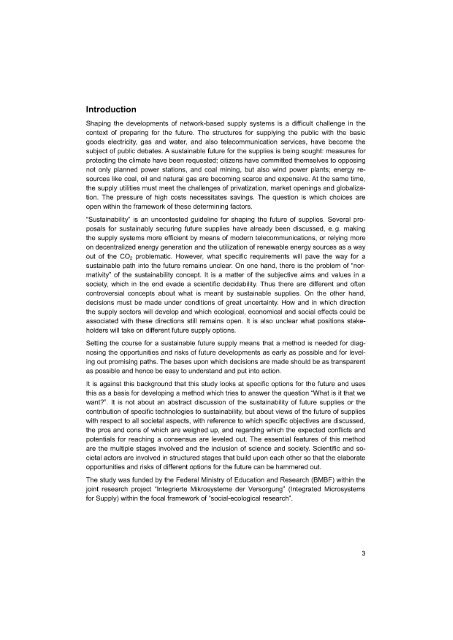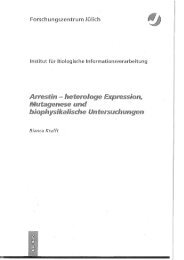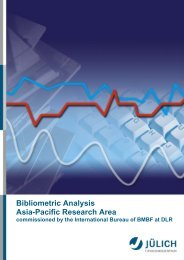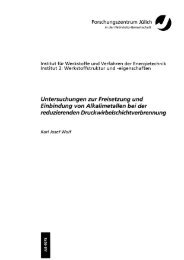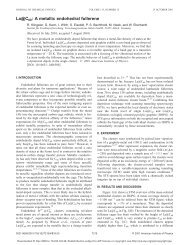netzgebundener Versorgung
Chancen und Risiken zukünftiger netzgebundener ... - JuSER
Chancen und Risiken zukünftiger netzgebundener ... - JuSER
Create successful ePaper yourself
Turn your PDF publications into a flip-book with our unique Google optimized e-Paper software.
Introduction<br />
Shaping the developments of network-based supply systems is a difficult challenge in the<br />
context of preparing for the future. The structures for supplying the public with the basic<br />
goods electricity, gas and water, and also telecommunication services, have become the<br />
subject of public debates. A sustainable future for the supplies is being sought: measures for<br />
protecting the climate have been requested; citizens have committed themselves to opposing<br />
not only planned power stations, and coal mining, but also wind power plants; energy resources<br />
like coal, oil and natural gas are becoming scarce and expensive. At the same time,<br />
the supply utilities must meet the challenges of privatization, market openings and globalization.<br />
The pressure of high costs necessitates savings. The question is which choices are<br />
open within the framework of these determining factors.<br />
"Sustainability" is an uncontested guideline for shaping the future of supplies. Several proposals<br />
for sustainably securing future supplies have already been discussed, e. g. making<br />
the supply systems more efficient by means of modern telecommunications, or relying more<br />
on decentralized energy generation and the utilization of renewable energy sources as a way<br />
out of the CO 2 problematic. However, what specific requirements will pave the way for a<br />
sustainable path into the future remains unclear. On one hand, there is the problem of "normativity"<br />
of the sustainability concept. lt is a matter of the subjective aims and values in a<br />
society, which in the end evade a scientific decidability. Thus there are different and often<br />
controversial concepts about what is meant by sustainable supplies. On the other hand,<br />
decisions must be made under conditions of great uncertainty. How and in which direction<br />
the supply sectors will develop and which ecological, economical and social effects could be<br />
associated with these directions still remains open. lt is also unclear what positions stakeholders<br />
will take on different future supply options.<br />
Setting the course for a sustainable future supply means that a method is needed for diagnosing<br />
the opportunities and risks of future developments as early as possible and for leveling<br />
out promising paths. The bases upon which decisions are made should be as transparent<br />
as possible and hence be easy to understand and put into action.<br />
lt is against this background that this study looks at specific options for the future and uses<br />
this as a basis for developing a method which tries to answer the question "What is it that we<br />
want?". lt is not about an abstract discussion of the sustainability of future supplies or the<br />
contribution of specific technologies to sustainability, but about views of the future of supplies<br />
with respect to all societal aspects, with reference to which specific objectives are discussed,<br />
the pros and cons of which are weighed up, and regarding which the expected conflicts and<br />
potentials for reaching a consensus are leveled out. The essential features of this method<br />
are the multiple stages involved and the inclusion of science and society. Scientific and societal<br />
actors are involved in structured stages that build upon each other so that the elaborate<br />
opportunities and risks of different options for the future can be hammered out.<br />
The study was funded by the Federal Ministry of Education and Research (BMBF) within the<br />
joint research project "Integrierte Mikrosysteme der <strong>Versorgung</strong>" (Integrated Microsystems<br />
for Supply) within the focal framework of "social-ecological research".<br />
3


